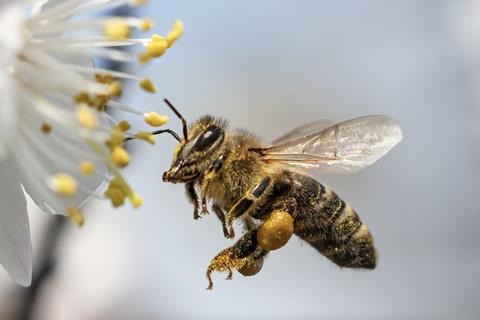Healthy bee populations are key to agriculture in South Africa, with 50 different crops relying on pollination for their success

It is acknowledged in most fruit growing regions around the world that the honey bee is vital for successful fruit farming.
In South Africa, the Western Cape Industry (WCBA) has warned that without healthy and thriving honey bee populations, the province’s agricultural output will face severe challenges, potentially leading to reduced crop yields and economic losses.
This comes after recent media reports that honey bees are also under threat in the US, where populations have dwindled.
Industry organisation Hortgro said the deciduous fruit industry has already signed a Bee & Pollination Charter to address the plight of bees in the country.
“The initiative came amid global concern about honey bee populations, which have seen drastic declines and fears that the species might face extinction,” Hortgro stated.
”The scale of the problem is massive, as between 50 per cent and 80 per cent of the world’s food supply – fruits, vegetables, seeds – is directly or indirectly dependent on honey bee pollination.”
Hugh Campbell, the former general manager at Hortgro Science, said that bees are an integral part of the industry supply chain and without them, their production capacity would be diminished.
“It’s strategically important that they are protected and the charter forms a framework around which we can ensure that we can have a sustainable bee population in the South African context,” he said.
Chris Nicklin, chairman of the WCBA, noted that “there has been what could amount to bee carnage in some areas.”
He confirmed the welfare of indigenous honey bees is not merely a beekeeping issue – it should concern everyone.
The WCBA raised alarms over a concerning increase in honey bee poisoning across the province, attributed to the careless and often uninformed use of agricultural chemicals.
At Riversdale in the Southern Cape, beekeeper Jannie Nothnagel has lost about 70 honey bee colonies in two separate incidents in recent months.
The WCBA says laboratory analyses revealed that in this case, bees were poisoned by fipronil, an insecticide with high toxicity for bees and strict usage restrictions.
At Worcester in the Western Cape, a beekeeper, who provides large-scale pollination services to agricultural farms, has reported the loss of about 600 of his colonies at a single site.
The beekeeper, who has asked that his name be withheld, attributes this to the reckless use of agricultural chemicals.
According to reports, laboratory tests on dead bees from the site detected fungicides, which, although generally non-lethal to bees, can become toxic if applied incorrectly.
The beekeeper said he was “in a big financial crisis,” highlighting the economic repercussions of such incidents on beekeepers.
The loss of healthy bee populations not only threatens biodiversity but also jeopardises the agricultural economy, which depends heavily on pollination services to maintain high yields and quality produce.
Honey bees pollinate more than 50 different food crops in South Africa, including fruits, nuts, and vegetables.



